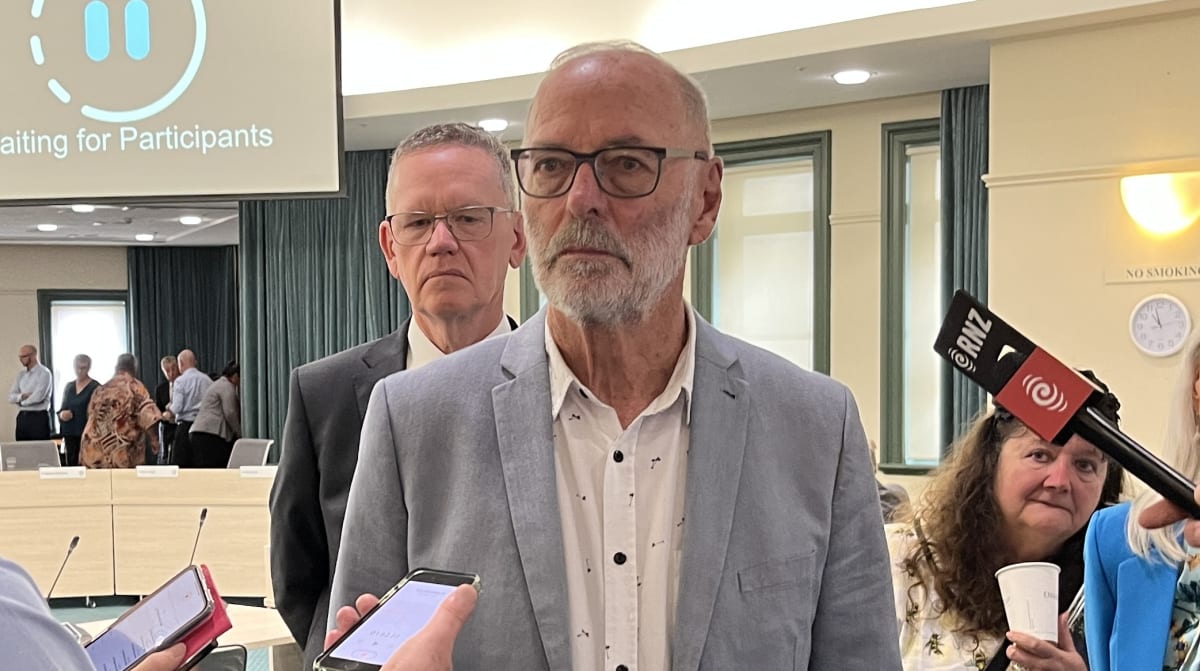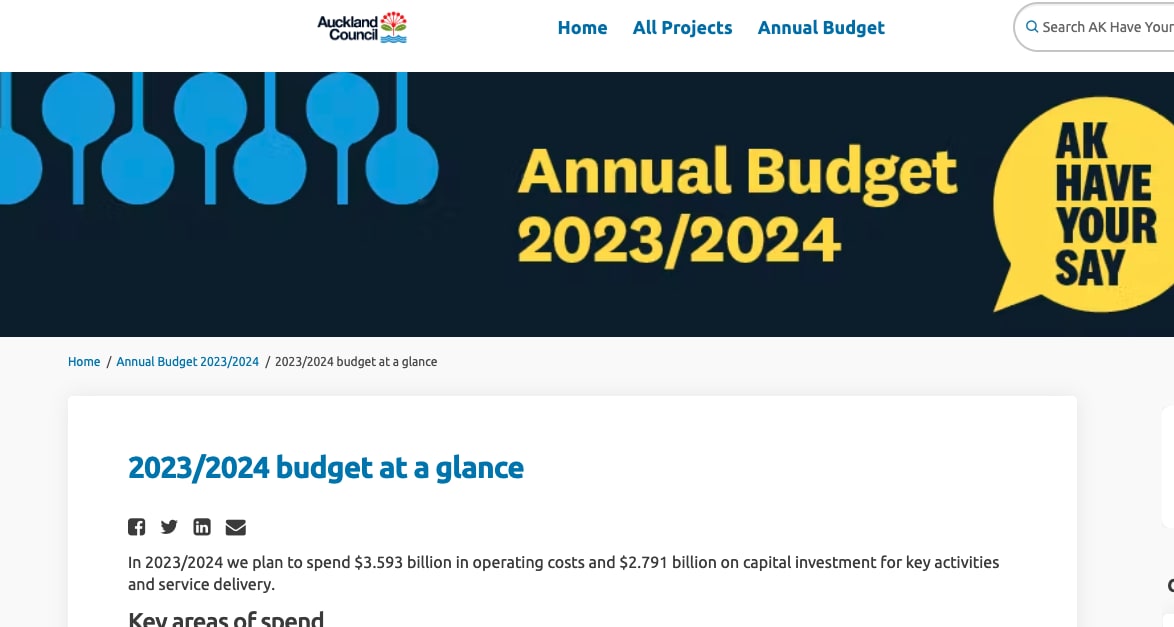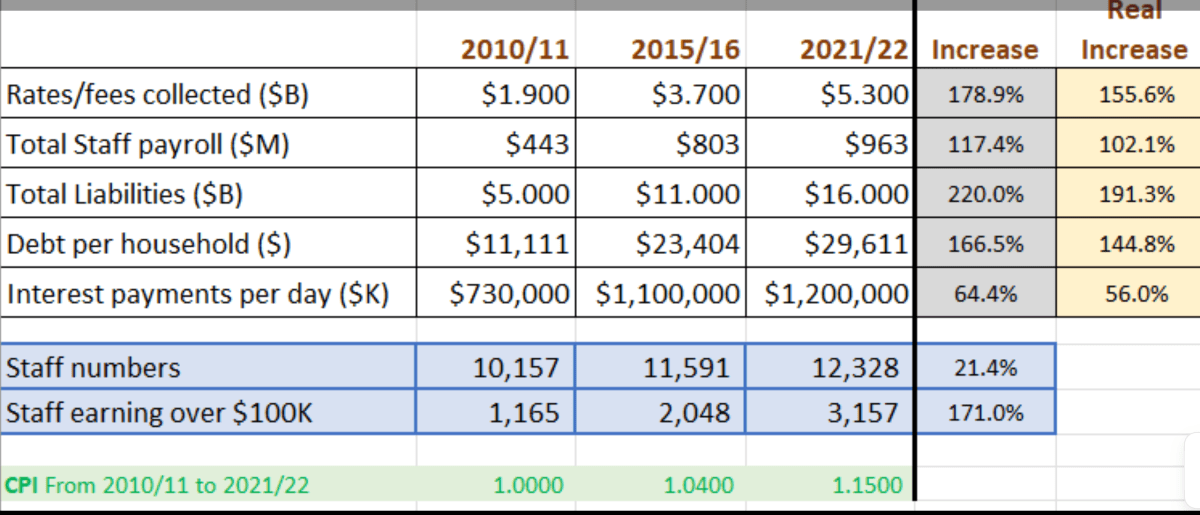
A self-described 'lunatic geek' now in charge of cutting spending at the country's biggest council is ruffling bureaucratic feathers
Maurice Williamson, the former MP most famous for his 'Big Gay Rainbow' speech in Parliament, now finds himself seeing nothing but a "ginormous wall".
So big a wall - of opaque council spending and bureaucratic delays at Auckland Council - that he reckons he can't get far enough back from it to see exactly how great the obstruction is.
Williamson, former National MP and cabinet minister, NZ trade envoy in Los Angeles, data tragic and now Auckland councillor, is the brains behind Mayor Wayne Brown's big pledge to cut the council down to size and 'fix' its finances.
He's been turning his restless, whirling dervish of a brain to working out what, how and why Auckland Council spends the billions it raises each year in rates and other income.
The first few months of work have led to obvious tensions, with several councillors saying publicly the expenditure control committee's chairman is being stymied by officialdom.
Williamson has now agreed to speak out in an interview with Newsroom, saying:
- the council chief executive and chief financial officer declined to provide him with financial information he says he needs to re-engineer its spending;
- council debt-servicing costs could hit $1 billion a year if current hedged loans have to be reset at market rates over the next two years; And that's before you take on whatever part of the $1 billion City Rail Link cost blowout announced yesterday that the council must carry
- substantial downsizing of head office staff numbers, especially among the higher-paid ranks, is likely with a one-off cost of redundancies - to be followed by a 'steel lid' on costs and employee numbers to stop a return to over-staffing;
- if the proposed sale of the $2.3 billion of council Auckland Airport shares proceeds, and that sum is used to cut debt and save $85m a year in interest, no extra council debt should be entertained;
- he doubts official lines that the ballooning of Auckland Council's costs since its formation in 2010 are down to population growth, Covid and central government edicts.
He is a forthright and, at times, controversial public figure, having been suspended from National's caucus in 2003 for criticising then-leader Bill English, and after his return, losing his cabinet post in 2014 for intervening with police about an investigation into a Chinese businessman.
As chair of the council's expenditure control and procurement committee, Williamson doesn't expect to be doing much community ratepayer representation in his home ward of Howick.
He wanted to be on the council for one reason - to do a line-by-line analysis of the council's finances, something he cut his teeth on in the Bolger-Richardson National government of the early 1990s.
Williamson served on that administration's 'razor gang' chaired by former MP and Speaker Doug Kidd. He remembers the committee repeatedly demanding and receiving micro, granular details from the public service of what various departments and funds spent and why.
Williamson kept his paper records from that committee, found them last year in his personal archives and rolled up to the council once elected last October with a bundle under his arm and a "lunatic geek's" desire for line-by-line spending data.
But he was in for a shock. Whereas former Secretary to the Treasury Graham Scott fully supported the government committee's forensic work, Auckland Council's executive leadership has not, according to Williamson.
He, and other councillors, portray efforts to obtain detailed spending data from the council organisation as having been like pulling teeth.
When others have raised this complaint around the council table at meetings over the past month, Williamson and the mayor have remained silent.
Now Williamson has told Newsroom that while he had been on the verge of a complaint to the Auditor-General, he finally received information on Tuesday that he can work with.
On Wednesday, things took a turn for the worse with confirmation of the CRL underground project's need for another $1 billion from the Government and council. "The $1b hole, and still more to come, for CRL blows a huge hole in our budgeting work," Williamson says.
The council also issued its first estimate of its likely costs from the summer's storm damage - $900m.
The tension over access for politicians to the inner workings of the council's operations has been evident for weeks. Chief executive Jim Stabback resigned halfway into his five-year term, for "personal reasons".
Asked by Newsroom if the struggle over access to operational financial information could have played a part in Stabback's decision, Williamson would only say, "You might say that. I couldn't possibly comment".
But he will say that Stabback and the chief financial officer Peter Gudsell resisted his requests for extensive financial data.

"We run into the big problem of the staff here, from the chief financial officer and the chief executive, saying 'No, you're trying to breach the line between governance and management. Your elected and governance job is to set the strategic direction for us, our role is to run the day-to-day operation of the council.'
"They're drawing a line in the sand," Williamson says.
"And I said, 'Well I agree with you partially - that we should not be managing. We are elected governors but we don't know how to ask the right questions. And if we get the good information, I'm not going to use it to make the cuts, I'm going to use it to ask the questions: e.g. How come this has gone up way above inflation? If it's a population driven thing, let's see what the population growth has been'?"
He contrasted Stabback's attitude with that of the former Treasury secretary Scott. "It would have been like if Graham Scott and Treasury had come back and said 'Oh, we're not prepared to give you that'. The whole place would have gone up." Heads would have rolled, the former MP claims.
The council chief executive's stance was incorrect. "I guess if it was his company, if he was the owner of the company, I think he has got a right to say, 'Go away'. But he is just the custodian of the public purse.
"We've got to make sure that we're getting the very best value for money. And I don't think I can put my hand on my heart and say I even know we are close to that. Therefore the best way to do it is the old sunlight is the best disinfectant. Expose the dataset, make it available to the public. Have the public go online and drag down the data. Then we can justify things if they are justifiable, and if they're not, we look like clunkers because we were spending money that was a waste of time."
Last Friday, after weeks of waiting, officials gave Williamson "a couple of hundred thousand" records, which he viewed as inadequate. Then he had a follow-up meeting on Tuesday afternoon to tell finance staff the data they'd provided accounted for only $1.2 billion of the $3.1 billion of 2022 council spending. He told Newsroom further progress on the expenditure data had been forthcoming.
Before that offer, he had been frustrated. "Right now, I've just got a massive building, it's way bigger than it used to be. But I don't know where the cost went up.
"My only option left, and I'm happy to tell you this is that I will write to the Auditor-General if I have to.... because we can't do our job without it."
He added, "I would imagine the Auditor-General will side with me and say 'No, you have a right under the Public Finance Act.'
After Tuesday's further download, Williamson said it looked to be adequate and he hoped finally to make progress without outside help.
What's driving the councillor is data he's set out from council information that shows the great promise of savings and rationalisation by creating the Super City in 2010 has not only failed to materialise but the council and its costs have grown substantially. Williamson presents this table on his phone:
"What was planned was a slimmed down operation. What was planned was a cost reduction operation. What was planned was a staff rationalised operation and more delivery outcomes occurring. It hasn't happened and no one can debate that."
He is dismissive of the official line that the council has cut $2 billion plus in spending over its four terms, saying that is like saying 'It could have gone up more but it didn't".
Williamson quotes a favourite Latin phrase meaning 'against fact, there is no argument', for the importance of the figures - the raw numbers, the percentage increase and even the results after cumulative inflation over the 12 years of the council's life has been factored in.
"And these are the facts about what's happened to staffing levels, to salaries, to expenditure, to debt. We're $11.7 billion in debt, $11.7 billion."
Rising interest rates make cause for real concern, he says.
"Most of those debt loans are hedged at 1.2 and 1.3 percent, because we got a fixed rate, but they come off hedge over the next year or the next two years.
"And we've got to go to the market for market interest rates. Now you might have spotted a trend out there that interest rates are sort-of-slightly sneaking up on us, and we're going to be 3.5 or 4 percent at best. So it's going to be more than doubling.
"So one and a half million dollars a day [the council is currently spending on debt servicing] is going to at least three million a day, that's three million a day times 365 and you're over a billion a year of debt servicing - just servicing the debt," he says.
"So the idea that we keep accumulating more debt and more debt, it's got to stop. No household could carry on accumulating debt at the rate we are and just keep funding it, unless you've got that one magical thing of a revenue lever you can just pull back and there's more rates and more rates and more rates."
He says the latest numbers to councillors show that in the first seven months of this financial year the council has borrowed a further $537 million.
Williamson is sceptical of council officials' explanations that part of the increase in overall spending is down to population growth, part to the Covid pandemic and part to extra costs burdened on Auckland by central government.
He notes that things were growing substantially well before Covid, citing the mid-point year of 2015/16 on his table above.
"I'm hard pressed to find big items that are driven by population growth. I'm hard pressed to find anything that can grow above inflation without giving me a reason for it.
"And I still think there is a big myth, that central government has added all the extra costs. Well, let's identify it and say that if it is simply due to legislation forcing us to an extra cost, let's show that and put it up there."
He says he would be happy to be proven wrong on some of his views. "I'm not going to stand and say 'I thought this and my prejudices are right'. But I need the facts. You cannot get that factual basis for the debate to occur. But we're making progress. It's been long. It's been slow. It's been resisted by the chief executive who was saying no."

The work of Williamson's committee is unlikely to impact the current Mayoral Budget Proposal which is for the July 1, 2023 - June 30, 2024 financial year and is already out for public consultation.
He might, he thinks, turn up some possible savings that Brown might need to substitute into his planned budget if councillors reject elements of the current package.
But the expenditure and procurement committee's review is targeted more at the following year's budget and then the Long Term Plan, a 10-year budget beyond that.
Without a 'control' department such as the Treasury in the central government context, it had been difficult to get into the council's spending. "There were enough checks and balances down there that were independent: Treasury, state services, they could make decisions about employment levels and so on.
"Here, there isn't that oversight or independence. And so we've got to be almost doing it ourselves. It's much harder.... The problem is, it's the structure here."
A cornerstone of the current mayoral budget is the plan to sell the council's 18 percent shareholding in Auckland International Airport Ltd, valued at more than $2.3 billion.
Williamson says in the context of forecast debt payment levels, the sale is an obvious necessity. Some councillors want 'guardrails' put around that sale, that the proceeds go exclusively to reducing the council's $11.7 billion debt, and that no further borrowing is permitted to ensure debt costs don't just rise again, with no asset left to sell.
"It's just a dormant, passive investment which has been returning nothing. And even if it does get back to really full dividends it won't come close to covering what the debt servicing [for the equivalent value of the shareholding] would be. "It's $85 million at present but you can guarantee with interest rates going where they are, you're looking at nearly doubling that. You're never going to get that rate of a dividend return from an airport.
"I just don't know why you'd be wedded to it."
The argument from some councillors that even if the airport stake gets sold, the council would continue to rack up debt back to its previous levels, and with no shares left to sell, had some merit.
"If we sell these shares, we have to do it with hand on heart to say we're not running more debt."
In the short term, for this year's budget, Williamson predicts everyone around the council table will have to "swallow some rats". I'll have to, everyone will have to, to make sure that we have a functioning council with our finances under control."

While Williamson was struggling to get access to financial files, he does have a councillor's access card through the organisation's head office on Albert St. He's already concluded the former ASB Bank HQ is "grossly over-specced for what we need", lamenting the fact the previous council didn't use its land or empty council properties at Manukau or elsewhere in 2012/13 instead of buying the CBD building for $101m.
"They bought this, paid just a fortune to buy this building."
He says the top floors - connected by a swirling grand staircase - are a museum of empty board and meeting rooms, kitted out but with very few people using them, and notes the penthouse floor's grand board room with a $54,000 table inherited from ASB.
Plainly a lower-rise, smaller home for the council is a future target for the expenditure committee.
On staff headcount reductions, Williamson says mooted cuts to funding for Citizens Advice Bureau and childcare centres pale into insignificance when compared with the head office costs.
"The huge growth in staff here and the huge growth in staff at high levels. Now, you can't get rid of staff without it costing you in the short-term. You have to pay out a redundancy pay or whatever, you're going to downsize. But are we prepared to make a big, bold call and take a hit for a year in terms of redundancy payments in order to get ourselves back into realistic shape?"
He's conscious of a slide back into spending and growing head counts. "So often, the redundancies are paid out and then five years later the numbers are back to where they were. So you're getting nothing unless there is a very rigid demand to hold that line. We get to this point and we put a steel lid across any numbers growth and spending."
Williamson was always seen as a free market hawk in central politics.
"The thing that has never stopped really getting at me is how easy people spend other people's money. Yeah, it's not their money. This is not my money. This is ratepayers', who are struggling like stink, when they go to the grocery store, when they go to the petrol station," he says.
"And we better be certain that when we put any rates increase on them, especially fixed-income people, pensioners and so on, that we can justify services are being delivered at a better rate and a better quality because of this money. And that's not just some amorphous mess with [rates] disappearing into it.
"So, I'm going to get there, one way or the other."








